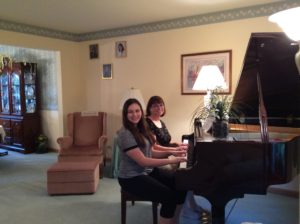 Lessons are available for beginner through advanced, beginning at age 5 years and older. Yes, I teach adult piano lessons, too! It is never too late to start learning or to get back to learning to play piano. A 30-minute private lesson occurs weekly during the school year.
Lessons are available for beginner through advanced, beginning at age 5 years and older. Yes, I teach adult piano lessons, too! It is never too late to start learning or to get back to learning to play piano. A 30-minute private lesson occurs weekly during the school year.
During the year students will attend an hour-long piano party. At a piano party students will perform a specially prepared piano piece for each other, play music theory games and build camaraderie with other piano students. Adult students are not required but may choose to participate in any of the activities the youth students are offered if desired.
Lessons will address the fundamental aspects of playing the piano through proper technique, music theory, note reading, rhythm, ear training, sight-reading, improvisation and composition. Students will learn a variety of music styles including classical, popular, jazz and blues.
All music that I require for lessons will be given to the student at lessons and billed separately from the monthly lesson tuition. Traditional piano methods are utilized: “Piano Adventures” by FJH, David Glover and Alfred d’Auberge. Other methods are used according to students needs. Supplementary books and sheet music are included in student’s repertoire. Music brought to lessons by students will be used if compatible with the student’s music program..
Be Prepared To:
- Please park on the street in front of the house.
- Be prompt. Arrive and leave as close to your lesson time. There is no waiting by parents, brothers and sisters or friends not taking lessons. Parents of young students are encouraged to wait during the lesson.
- Enter quietly, so as not to interrupt the lesson in progress.
- Come with ALL current music and materials in a book bag.
- Bring their piano assignment notebook and binder.
- Bring homework or books to read while waiting for a sibling’s lesson.
- Finish snacks before you arrive and wash your hands if they are sticky. No food, gum, or non-water drinks are allowed.
- Ask questions to understand your practice assignment.
- Use your best learning skills and manners.
Practice Expectations
Practice is the responsibility of both the parent and the student. Few children have the self-determination to practice on their own day after day. Parents need to provide leadership, a listening ear, lots of encouragement, a time set aside each day without distraction and a fully functional and well-tuned piano or full-sized weighted keyboard or digital piano for daily practice. A metronome or metronome App will be needed for practice at home. Parents are invited to observe lessons from time to time and I welcome parental communication. Parents of very young students may need to sit in on lessons to take notes to help with practice.
The most important time for the student to practice is immediately following the lesson – or at least on the same day as the lesson, after the student has received instruction. Research indicates that retention rate is as high as 90% on the first day, whereas it drops to almost 60% if the students waits just 24-hours. Sufficient practice is necessary for a student to have a good experience at the lesson. Students feel secure and will be more responsive if they are prepared.
A student’s progress is determined by dedicated practice, not by simply attending lessons. Ideally, students should practice at least 4-5 days a week. Students should practice long enough to complete their weekly assignments. If a student is repeatedly unprepared for lessons, the lessons will be terminated.
Performances
Each year we have one annual piano recital to which parents, relatives, and friends are invited. Playing at this recital is encouraged, but not mandatory. Please discuss this with me, if there is a problem in this area.
Mrs. Kasen is a member of DEMTA, Douglas-Elbert Music Teacher Association. Students who are diligent and consistent with their lesson practice and confident with their performing are encouraged to challenge themselves by participating in DEMTA events: community connection performances, monthly recitals and the annual Festival.